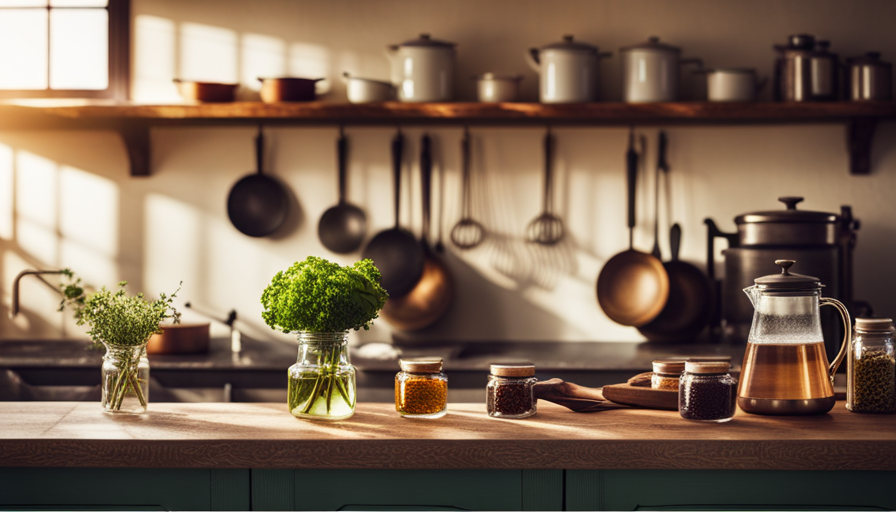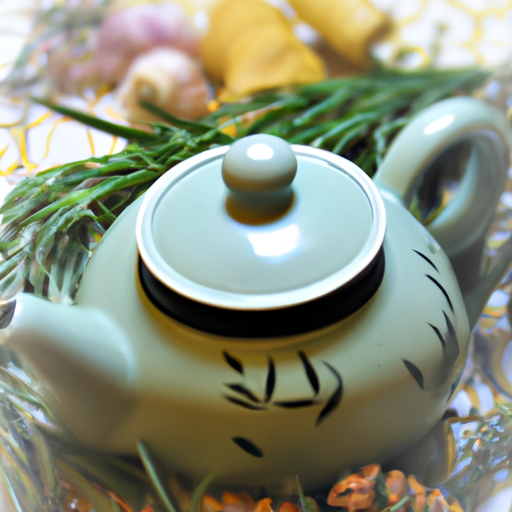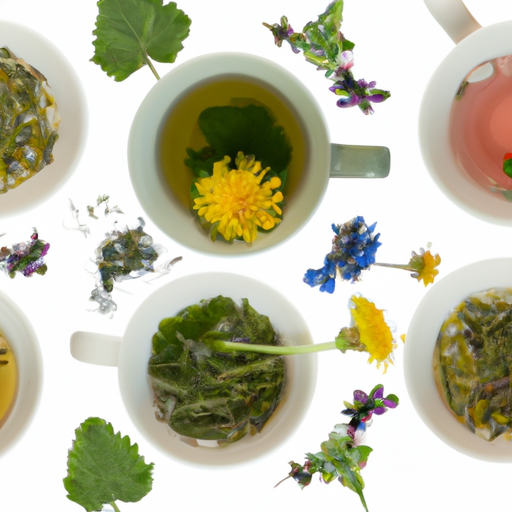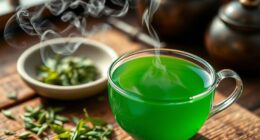Picture a comforting, hot cup of tea that not only nourishes your body but also satisfies your taste buds.
Now, picture that tea infused with the sweet and tangy flavors of fresh blueberries. Sounds heavenly, doesn’t it?
Well, today I’m here to show you how to make your own homemade blueberry herbal tea.
With just a few simple steps, you can create a delightful beverage that is not only refreshing but also packed with antioxidants and other beneficial compounds found in blueberries.
From gathering the ingredients to steeping the berries and finally enjoying a steaming cup of goodness, I will guide you through the entire process.
So, grab your favorite mug, put on your apron, and let’s get started on this journey to create a truly special tea that not only brings comfort but also nourishes your body and soul.
Get ready to savor the natural goodness of blueberries in every sip of your homemade blueberry herbal tea.
Key Takeaways
- Blueberry herbal tea is a warm and soothing beverage that offers numerous health benefits.
- Blueberries are infused into the tea, providing sweet and tangy flavors.
- The tea is packed with antioxidants and beneficial compounds found in blueberries.
- Blueberry herbal tea can be enjoyed warm or chilled, and can be enhanced with sweeteners, flavors, and other fruits or herbs.
Gather Your Ingredients and Equipment
Now, you’ll need to grab a handful of plump blueberries and your trusty tea infuser to start brewing your delicious herbal tea.
Herbal tea is not only a soothing beverage but also offers numerous benefits for overall health. It’s packed with antioxidants that help protect your cells from damage and boost your immune system. Blueberries, in particular, are rich in anthocyanins, which have been shown to improve brain function and reduce the risk of heart disease.
To make your herbal tea, you’ll need a few different types of equipment. Firstly, a tea infuser is essential for steeping the blueberries and extracting their beneficial compounds. This small, mesh container will hold the blueberries while allowing the hot water to circulate around them, infusing the tea with their flavor and nutrients.
Additionally, a teapot or a cup with a lid is recommended to keep the tea warm during the steeping process. This ensures that you get the full flavor and benefits from the blueberries.
Now that you have your ingredients and equipment, it’s time to rinse and prepare the blueberries.
Rinse and Prepare the Blueberries
First, you’ll wanna rinse and get those blueberries all nice and squeaky clean. Blueberries are not only delicious, but they also offer numerous health benefits. These little blue powerhouses are packed with antioxidants, vitamins, and minerals that support overall well-being. In fact, studies have shown that blueberries can improve brain function, promote heart health, and even help with weight management.
There are different ways to incorporate blueberries into your herbal tea. One option is to mash the blueberries and add them directly to the tea. This will infuse the tea with a burst of blueberry flavor and enhance its antioxidant properties. Another method is to steep the blueberries in hot water and strain them out before enjoying your tea. This allows you to savor the subtle sweetness and delicate aroma of blueberries without the fruit itself.
To help you visualize the benefits of blueberries in tea, take a look at the table below:
| Benefits of Blueberries in Tea | |
|---|---|
| Antioxidant-rich | Supports brain health |
| Promotes heart health | Enhances immune system |
| Aids in weight management | Boosts digestion |
Now that your blueberries are ready, it’s time to move on to the next step and boil water and add the blueberries, infusing your tea with their wonderful flavor and health benefits.
Boil Water and Add the Blueberries
After rinsing the blueberries, it’s time to get the water boiling and infuse it with the vibrant flavor and health benefits of these antioxidant-rich gems. Here’s a step-by-step guide to help you make a delicious and nutritious blueberry herbal tea:
-
Boil Water: Fill a kettle or pot with fresh, cold water and bring it to a rolling boil. Boiling the water ensures that it’s hot enough to extract the flavors and beneficial compounds from the blueberries.
-
Add Blueberries: Once the water reaches a boil, carefully add the rinsed blueberries to the pot. The heat’ll help release the natural compounds found in the berries, infusing the water with their delicious taste and health benefits.
-
Simmer: Reduce the heat to low and let the blueberries simmer in the water for about 10 minutes. This’ll allow the flavors to meld together and create a delightful infusion.
-
Strain and Enjoy: After simmering, strain the blueberries from the water using a fine mesh strainer or cheesecloth. Pour the infused water into a teacup or mug, and savor the aromatic and flavorful blueberry herbal tea.
Infusing tea with different fruits adds variety and lets you experience the unique health benefits of each fruit. Now that we’ve infused the water with the blueberries, it’s time to move on to the next step: steeping the blueberries to further infuse the flavor into the tea.
Steep the Blueberries to Infuse the Flavor
To truly unleash the full burst of flavor, let those juicy blueberries steep in the hot water, infusing every drop with an explosion of fruity goodness that’ll transport your taste buds to a blissful blueberry paradise.
Blueberries are not only delicious, but they also offer a range of health benefits when used to make herbal tea. There are several different herbal teas you can make using blueberries, each with its own unique flavor profile and potential health benefits.
One popular option is blueberry and lavender herbal tea. The combination of these two ingredients creates a soothing and calming effect, perfect for winding down after a long day. Another option is blueberry and mint herbal tea, which refreshes and invigorates the senses with its cool and minty taste.
Blueberries are known for their high antioxidant content, which can help protect the body against damage from harmful free radicals. They’re also a good source of vitamins and minerals, including vitamin C, vitamin K, and manganese. These nutrients can support immune function, promote healthy digestion, and help maintain healthy bones.
As the blueberries steep in the hot water, their natural flavors and beneficial compounds are released, creating a flavorful and nutritious herbal tea. Once the steeping process is complete, it’s time to strain the tea to remove the blueberry pulp, preparing it for the next step in the tea-making process.
Strain the Tea to Remove the Blueberry Pulp
Now that the blueberries have steeped in the hot water, it’s time for you to strain the tea and remove the pulp for a smooth and flavorful infusion. Straining the tea is an important step to ensure a pleasant drinking experience. It helps remove any remaining blueberry pulp, leaving behind a clear and delicious herbal tea.
To strain the tea, you will need a fine-mesh strainer or cheesecloth. Place the strainer over a teapot or a heatproof container. Carefully pour the infused tea through the strainer, allowing the liquid to flow through while catching the pulp and solids.
Straining the tea not only removes the pulp but also any seeds or skin that may have come loose during the steeping process. This results in a refined and visually appealing cup of tea.
Now, let’s take a moment to discuss the health benefits of blueberry herbal tea. Blueberries are rich in antioxidants, which can help protect the body against free radicals and reduce inflammation. Drinking blueberry herbal tea can also support heart health, improve digestion, and boost the immune system.
If you don’t have a fine-mesh strainer or cheesecloth, there are alternative methods to strain herbal tea. You can use a coffee filter, a paper towel, or even a clean nylon stocking. Just make sure it’s clean and free from any residue.
With the tea strained and ready, you can now move on to sweeten and flavor your tea (optional). Transitioning into the next section, let’s explore how you can add a touch of sweetness and enhance the flavor of your blueberry herbal tea.
Sweeten and Flavor Your Tea (Optional)
Once you’ve strained your delightful concoction, it’s time to add a touch of sweetness and a burst of flavor to your already exquisite blueberry-infused elixir. Sweetening and flavoring herbal tea can take it to the next level, transforming it into a truly memorable experience. Here are some discussion ideas about sweetening and flavoring herbal tea:
-
Natural sweeteners for herbal tea: Instead of using refined sugar, consider using natural sweeteners like honey, maple syrup, or stevia. These alternatives not only add sweetness but also bring their own unique flavors to the tea.
-
Creative ways to add flavor to herbal tea: Experiment with different herbs and spices to enhance the flavor profile of your blueberry tea. For example, adding a pinch of cinnamon or a sprig of fresh mint can elevate the taste and provide a refreshing twist.
-
Infusing fruits: Along with blueberries, you can infuse other fruits like strawberries, raspberries, or citrus slices to add a burst of fruity flavor to your tea. Simply muddle the fruits or let them steep in the hot water before straining.
-
Herbal blends: Consider blending your blueberry tea with other herbal teas like chamomile or lavender for a unique and soothing blend. These herbs not only add flavor but also offer their own therapeutic benefits.
Now that your tea is sweetened and flavored to perfection, it’s time to sit back, relax, and enjoy your homemade blueberry herbal tea.
Enjoy Your Homemade Blueberry Herbal Tea
Savor the rich, fruity essence of your handcrafted elixir as you indulge in a moment of pure bliss with your homemade blueberry herbal tea. Not only does this delightful beverage provide a refreshing burst of flavor, but it also offers numerous health benefits.
Blueberries are known for their high antioxidant content, which can help protect against cell damage and reduce the risk of chronic diseases. When brewed into a tea, blueberries release even more antioxidants, making it a great choice for promoting overall well-being.
There are several ways to enjoy your blueberry herbal tea. For a warm and comforting experience, simply steep your tea bag or loose tea leaves in hot water for about 5 minutes, then sweeten with honey or stevia if desired.
If you prefer a chilled option, let the tea cool down and then pour it over ice. You can also get creative by adding a splash of lemon juice or a sprig of fresh mint for a refreshing twist.
No matter how you choose to enjoy it, blueberry herbal tea is a delicious and nutritious addition to your daily routine. So sit back, relax, and savor the goodness of this homemade elixir as it nourishes your body and delights your senses.
Frequently Asked Questions
Can I use frozen blueberries instead of fresh ones?
Sure, you can use frozen blueberries for herbal tea. It’s ironic how freezing this superfood actually helps preserve its nutrients. In fact, using frozen blueberries in recipes can provide the same health benefits as fresh ones.
How long should I boil the water before adding the blueberries?
To ensure the best flavor and extraction, it is recommended to boil the water for about 5 minutes before adding the blueberries. This allows the water to reach the optimal temperature for extracting the flavors and nutrients from the blueberries.
Can I reuse the blueberry pulp for another batch of tea?
Yes, you can reuse the blueberry pulp for another batch of tea. The leftover pulp can also be used in smoothies, baked goods, or as a natural dye for fabrics.
What are some optional sweeteners and flavors I can add to my blueberry herbal tea?
For optional sweeteners in blueberry herbal tea, try honey, stevia, or agave syrup. To enhance the taste, experiment with adding lemon or lime juice, cinnamon, or a dash of vanilla extract.
Can I use dried blueberries instead of fresh ones for this recipe?
Yes, using dried blueberries for herbal tea is an option. However, using frozen blueberries may offer more benefits, as they retain nutrients and antioxidants. They can enhance the flavor and provide a convenient option.
Conclusion
In conclusion, making herbal tea out of blueberries is a simple and delightful process. By gathering your ingredients and equipment, rinsing and preparing the blueberries, boiling water and adding the blueberries, steeping to infuse the flavor, straining the tea to remove the pulp, and sweetening and flavoring to your preference, you can create a delicious and refreshing homemade blueberry herbal tea.
So why not give it a try and add a touch of berryliciousness to your tea time? It’s like a burst of sunshine in a cup, bringing joy and nourishment to your soul. Cheers to the wonders of nature and the delightful pleasures it offers!










